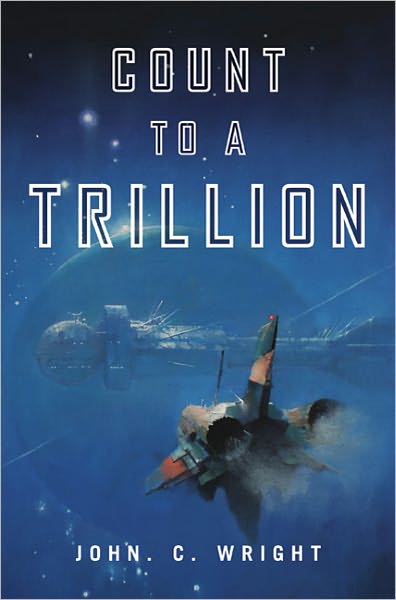John C. Wright, Count to a Trillion
reviewed by Danielle L. Parker

Count to a Trillion Publisher: Tor, 2011 Length: 450 pages ISBN: 978-0-7653-6745-7 |
I have to confess, about mid-way through the first in John C. Wright’s latest series, I had a weird fantasy pop into my head. I was in the audience, next to Robert Heinlein, with the good Dr. Asimov on the other side. Asimov was chortling and Heinlein chuckling while we passed a big tub of popcorn (real butter, of course) between us. Up on the stage in a conga line were other famous science fiction scientist writers: Edward Lerner, Vernor Vinge, Rudy Rucker, Greg Bear, Gregory Benford and many more I didn’t recognize.
Somehow Magic Mike got into this hallucination, because all the dancing scientists were ripping open their shirts (all had awesome pectorals, and Vernor Vinge had the cutest geek glasses: sorry, I couldn’t help that). All were shouting their come-ons: “Bell’s Theorem!” “Cardy’s a-Theorem!” “E=mc2!” (I’m afraid he was one of the old ones up there). “Hellmann-Feynman Theorem!” And more. It was a madhouse.
And... what? One of the dancing scientists was shouting in Latin. And sure enough, it was a gatecrasher: John C. Wright, more than holding his own with the flashing eggheads, while he ripped his lawyer’s pinstripe suit and shouted, “Acta exteriora iudicant interiora secreta!” “Nemo contra factum suum venire potest!” I couldn’t understand a word, but I can tell you, it was pretty cool, especially the pectorals.
As you can guess from this, John C. Wright has joined the ranks of the author-scientists who just can’t let a good story stand in the way of some come-on scientific exposition. I think I skipped about a quarter of his latest, Count to a Trillion, because Mr. Wright worked hard to prove what a physics professor could geek-speak, a lawyer-author could one-up and then some. I really did need the flashing pectorals to help me through, and alas, the only sex I got was way to the end of the four hundred plus pages, and a bit too coyly macho-man and blonde-princess for my taste. Though I suspect the Machiavellian blonde was laying on the cute for her caveman.
We start the story in a future ruined America, where Texans still speak cornpone and wear big guns, and everything’s gone to heck, so youngsters have to work as slave labor to get their next meal. Our genius youngster, who spouts the mathematical theorems from infancy, gets a job as a lawyer gunslinger... a wonderfully apt conjunction that made me laugh. The tongue-in-cheek gunslinger is literal in this case.
While Menelaus Montrose is gunning down luckless opponents and calculating trajectories of killing projectiles with his mathematical mind, he comes to the attention of a rich prince (of Monaco, the gambling kingdom, no less). The rich prince fairy godfather sends him to university to get an education (though Montrose hangs on to his Texas cornpone speech and he-man attitude for dear life).
Montrose then gets a berth on an enormously expensive spaceship headed to a rare anti-matter star. The star’s anti-matter promises unlimited energy for starved Earth, and while the astronauts are mining the figurative gold, they have a chance to figure out the meaning of a strange alien monument also left at the artificial star.
Montrose, however, doesn’t think humanity has the brains for that difficult task. Man must become Post-Human Man. So once on the starship, he injects himself with a weird concoction that should amp his intelligence up into the post-human... which it apparently does. But he goes insane first, is put into cold storage, and wakes up again, many years later, in an entirely altered Earth. And no one has figured out the Monument. But it looks like they’d better. Bad Super Aliens may be on the way to enslave the apes.
There is good stuff in this story: John C. Wright’s characteristic and wonderful grand sweep of vision being the best. The man draws Big Pictures. But the tiresome geek-speak inserted into too many pages maddened me.
Nor do Mr. Wright’s characters connect in this one. Montrose is a less-than-believable, less-than-likeable character for this reader. Supposedly he’s superhuman in his intelligence, but in fact he reminds me of a genius I once worked with in one of my own high tech jobs: book-smart but unable to find his own pinkie in terms of common sense.
The love interest, the equally superhuman smart Princess Raina, is painted in such overdone superlatives the reader is sure they must have finally nailed those sex hormones that overturn all rationality in this far future. She knows how to punch the caveman’s buttons, at least, and those buttons are still in apparent fine working order in spite of the caveman’s triple (quadruple?) digit IQ.
I consider Mr. Wright one of the best and most promising authors in the genre, with a rare ability to write true space opera and grand fantasy. But without a doubt, this is his worst so far. Please, Mr. Wright. You don’t have to flash the geek at us. You don’t need to prove lawyers are the smartest, or the fastest on the draw. We just want your wonderful stories.
Copyright © 2013 by Danielle L. Parker

